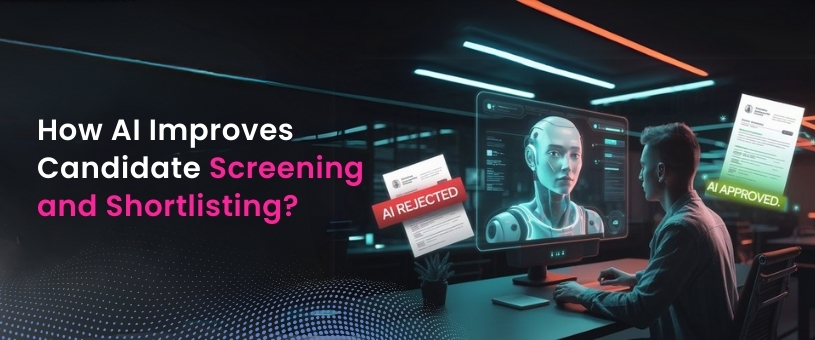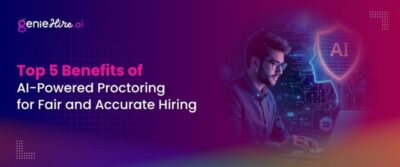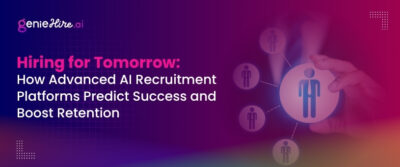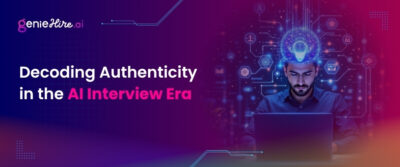In today’s fiercely competitive talent landscape, finding the right candidates quickly and efficiently is paramount. Businesses are constantly seeking an edge to navigate the deluge of applications, identify top-tier talent, and ensure a fair and unbiased hiring process. The traditional methods of candidate screening are often slow, prone to human error, and susceptible to unconscious biases, leading to missed opportunities and increased time-to-hire.
Enter Artificial Intelligence (AI). AI is a transformative force fundamentally reshaping how companies approach early-stage talent acquisition. By integrating sophisticated algorithms and machine learning into the hiring workflow, AI tools are streamlining the entire job applicant screening and shortlisting process, making it faster, fairer, and remarkably more accurate.
In this comprehensive guide, we’ll delve into the power of AI in enhancing candidate screening, exploring its methodologies, undeniable benefits, and how it’s becoming an indispensable tool for every forward-thinking talent acquisition team.
The Traditional Headache of Candidate Screening
Before we dive into the AI solution, let’s acknowledge the common pain points that plague manual resume screening:
- Overwhelming Application Volume: A single job posting can attract hundreds, even thousands, of applicants, making manual review a daunting and exhaustive task.
- Time-Consuming & Inefficient: Sifting through countless resumes to identify qualified candidates is incredibly time-intensive, delaying the hiring process and risking the loss of top talent to faster competitors.
- Prone to Human Error & Fatigue: Recruiters, despite their best efforts, can miss critical details or make inconsistent judgments when faced with high volumes of similar applications. Fatigue often leads to a decline in screening quality.
- Unconscious Bias: Human biases, whether conscious or unconscious, can inadvertently influence screening decisions based on factors like names, gender, age, or educational institutions, leading to a less diverse and potentially less qualified shortlist.
- Lack of Standardization: Without a consistent framework, different recruiters might evaluate candidates differently, leading to an uneven and unfair candidate experience.
These challenges highlight a clear need for a more robust and objective approach to candidate screening.
What is AI-Powered Candidate Screening?
AI-powered candidate screening refers to the use of artificial intelligence, machine learning (ML), and Natural Language Processing (NLP) technologies to automate, optimize, and enhance the initial stages of evaluating job applicants. It goes far beyond simple keyword matching, aiming to understand the deeper context of a candidate’s profile and potential.
At its core, AI applicant evaluation involves:
- Data Ingestion: Processing vast amounts of applicant data, including resumes, cover letters, application forms, and even public professional profiles.
- Intelligent Analysis: Using NLP to understand the meaning and context of text, not just keywords. ML algorithms learn from historical hiring data to identify patterns that correlate with successful hires.
- Automated Evaluation: Scoring candidates based on predefined criteria, skills, experience, and cultural fit markers, against the job description.
- Shortlisting: Presenting recruiters with a ranked or categorized list of the most suitable candidates, enabling faster decision-making.
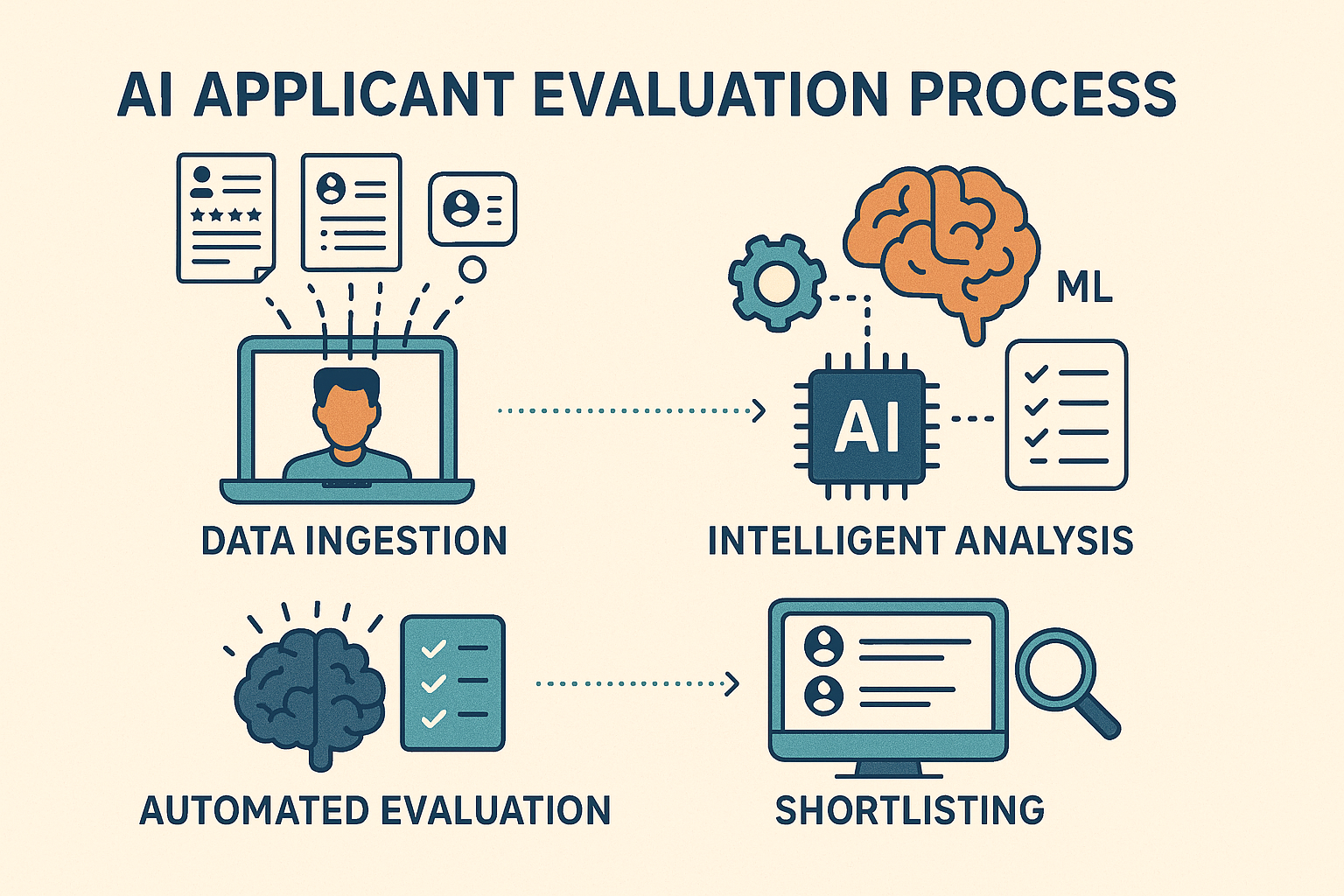
This technology allows recruiters to move beyond the superficial, focusing on a candidate’s true potential and alignment with the role.
Key Ways AI Transforms Candidate Screening and Shortlisting
AI’s impact on candidate screening is multi-faceted, bringing significant improvements across various aspects of the hiring funnel:
Automated Resume & Application Analysis
AI algorithms can ingest and analyze resumes, cover letters, and application forms at lightning speed. They go beyond simple keyword searches, using NLP to understand context, identify specific skills, experiences, and qualifications, and cross-reference them against job descriptions. This dramatically reduces the manual effort required, allowing recruiters to review hundreds of applications in minutes rather than hours or days. Critical information is highlighted, and irrelevant applications are filtered out efficiently.
Objective Skill & Competency Assessment
AI-powered platforms facilitate a new generation of assessments. These can include:
- AI-driven video interviews: Analyzing candidates’ verbal cues (e.g., clarity, coherence, use of industry terms) and non-verbal cues (e.g., eye contact, confidence, tone of voice) to provide objective insights into communication skills.
- Gamified assessments: Engaging candidates with interactive challenges that test problem-solving, cognitive abilities, and specific job-related skills in a fun and unbiased manner.
- Automated coding tests: For tech roles, AI can evaluate code submissions for correctness, efficiency, and adherence to best practices. These assessments provide a more holistic and objective view of a candidate’s capabilities, moving beyond the limitations of a static resume.
Bias Reduction & Fairness
One of the most profound contributions of AI to candidate screening is its ability to mitigate unconscious bias. Unlike humans, AI algorithms, when properly trained on diverse and unbiased datasets, do not perceive gender, age, ethnicity, or other protected characteristics. They focus solely on job-relevant criteria. By standardizing the initial screening process and relying on objective data points, AI helps create a level playing field for all applicants, promoting diversity and inclusion from the very first step.
Predictive Analytics for Better Fit
Advanced AI systems can analyze historical data from successful hires within an organization to identify patterns and traits that correlate with high performance, long-term retention, and cultural fit. This predictive capability allows the AI to score new candidates not just on their current qualifications but also on their potential for success within the company. This helps organizations make more informed decisions, moving from reactive hiring to proactive talent acquisition.
Enhanced Candidate Experience
While some might perceive AI as impersonal, its efficient nature actually benefits the candidate experience. Candidates often receive faster feedback on their application status, undergo more engaging and flexible initial assessments (e.g., on-demand video interviews), and experience a fairer process. This positive initial interaction can significantly improve a company’s employer brand and reduce candidate drop-off rates.
The Benefits: Why Your Business Needs AI for Candidate Screening
Adopting AI for candidate screening isn’t just about efficiency; it’s a strategic move that delivers tangible results for your organization:
- Significant Time & Cost Savings: Reduce the number of hours spent on manual resume reviews by up to 75%. This translates directly into lower operational costs and a reduced cost-per-hire.
- Higher Quality Hires: With more precise matching and objective assessments, companies can identify candidates who are a better fit for the role and the company culture, leading to improved performance and reduced turnover.
- Improved Diversity & Inclusion: By systematically removing human biases from the initial screening, AI helps cultivate a more diverse workforce, bringing in fresh perspectives and fostering innovation.
- Scalability for Growth: AI allows your talent acquisition team to effortlessly handle increasing application volumes as your company grows, without needing to proportionally increase recruiter headcount.
- Data-Driven Decisions: Gain valuable insights into your hiring funnel through AI-generated analytics. Understand which sourcing channels perform best, what skills are most common among top applicants, and where your process can be further optimized.
- Competitive Advantage: In a talent short market, the ability to quickly and accurately identify, engage, and onboard top talent provides a critical edge over competitors.
Implementing AI Candidate Screening: Best Practices
To maximize the benefits of AI in your candidate screening process, consider these best practices:
- Define Clear Goals: Before investing, identify the specific challenges you want AI to solve (e.g., reducing time-to-hire for high-volume roles, improving diversity in tech hires).
- Start with a Pilot Program: Begin by implementing AI screening for a specific department or a few job roles to test its effectiveness and refine your approach.
- Ensure Seamless Integration: Choose an AI platform that integrates effortlessly with your existing Applicant Tracking System (ATS) or HRIS to maintain a unified data flow.
- Maintain Human Oversight: Remember, AI is a powerful assistant, not a replacement. Recruiters should always review the AI’s shortlisted candidates and make the final human judgment call.
- Train Your Team: Educate your recruiters and hiring managers on how to effectively use the AI tools, interpret the data, and leverage insights for better decision-making.
- Monitor & Refine Continuously: AI models learn over time. Regularly review the performance of your AI screening tools, analyze data, and provide feedback to fine-tune algorithms for ongoing improvement.
- Prioritize Data Privacy & Ethics: Ensure your chosen AI solution adheres to global data protection regulations (like GDPR and CCPA) and operates with transparent, ethical AI principles. Candidates should be informed about the use of AI in the process.
Future Trends in AI Candidate Screening
The evolution of AI in applicant screening is far from over. We can anticipate:
- More Sophisticated Behavioral Analysis: Deeper insights into soft skills, cultural fit, and team dynamics through advanced AI analysis of verbal and non-verbal cues.
- Hyper-Personalized Candidate Journeys: AI adapting the screening process based on individual candidate profiles and interactions.
- Integration with Immersive Technologies: Use of VR/AR for highly realistic job simulations as part of the assessment process.
- Emphasis on Explainable AI (XAI): Greater transparency in how AI makes its recommendations, building trust with both candidates and recruiters.
Ready to Revolutionize Your Candidate Screening? Discover GenieHire.ai
The age of manual, biased, and inefficient candidate screening is drawing to a close. AI is here to usher in an era of precision, fairness, and speed in talent acquisition. By leveraging AI-powered solutions, your organization can overcome the challenges of high application volumes, mitigate bias, and consistently identify the best-fit candidates faster than ever before.
At GenieHire.ai, we are committed to empowering businesses with cutting-edge AI for candidate screening that transforms your hiring process. Our platform helps you automate initial reviews, conduct objective assessments, and ensure a fair and efficient journey for every applicant.
Ready to revolutionize your candidate screening and find your next top talent? Discover how GenieHire.ai can help you build a smarter, fairer, and more efficient hiring strategy.
Frequently Asked Questions (FAQs) About AI Candidate Screening
How does AI reduce bias in candidate screening?
AI reduces bias by focusing solely on objective, job-relevant criteria. Unlike humans, AI algorithms are not influenced by unconscious biases related to factors like gender, ethnicity, age, or educational background. When trained on diverse and fair datasets, they apply consistent evaluation standards to all applicants.
Is AI candidate screening suitable for all job roles?
AI candidate screening is highly versatile and can be applied to a wide range of roles. It’s particularly effective for high-volume roles where manual screening is inefficient. For highly specialized or senior roles, AI can effectively narrow down the candidate pool, allowing human recruiters to focus their time on more in-depth qualitative assessments for a smaller, highly qualified group.
What data does AI use for candidate screening?
AI primarily uses data provided by candidates, such as resumes, cover letters, application forms, and responses from structured assessments (e.g., video interviews, cognitive tests, skill challenges). Some systems may also analyse publicly available professional profiles (like LinkedIn) if explicitly permitted and ethically sourced.
Can AI candidate screening replace human recruiters?
No, AI candidate screening is designed to augment, not replace, human recruiters. It automates repetitive and time-consuming tasks, provides objective insights, and identifies top candidates. This frees up recruiters to focus on high-value activities like building relationships, conducting in-depth behavioural interviews, negotiating offers, and strategic talent planning.
How secure is AI in candidate screening regarding privacy?
Reputable AI hiring platforms prioritize data security and privacy. They adhere to global regulations like GDPR and CCPA, employing encryption, secure data storage, and strict access controls. It’s crucial to choose a vendor that is transparent about its data practices and ensures candidate data is used ethically and securely.

